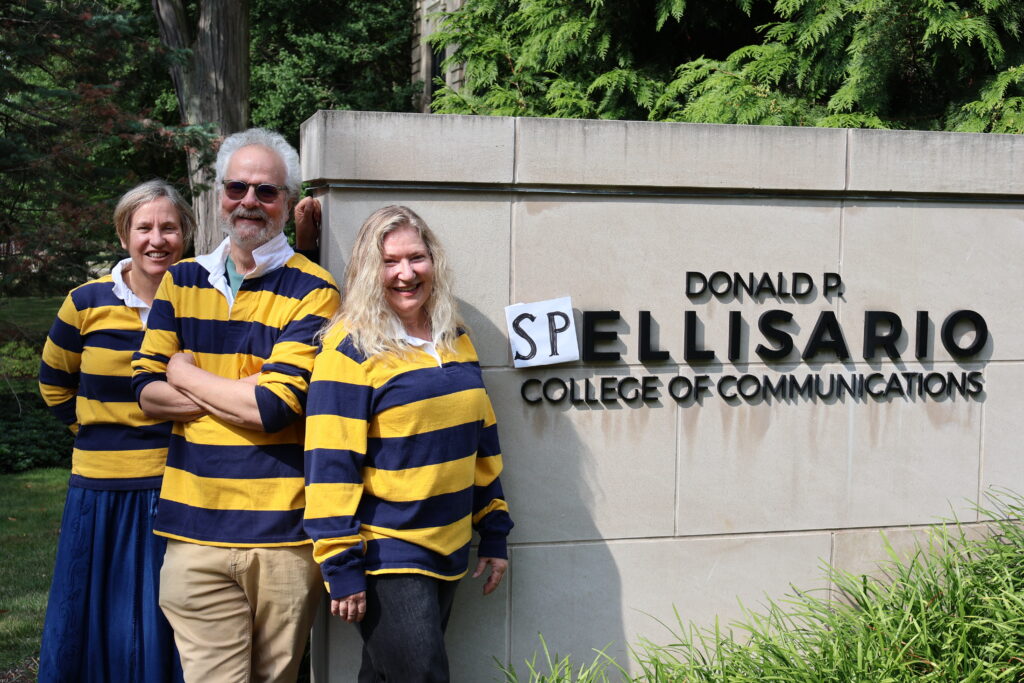This story originally appeared in the September 2024 issue of Town&Gown magazine.
I was the last speller standing in the 1981 eighth-grade spelling bee at Butler Junior High School. This distinction won me an official “Achievement in Spelling” certificate and a trip to Buhl Planetarium in Pittsburgh for the next level of competition.
I don’t remember the word that ultimately stumped me in Pittsburgh, but a scrapbook entry in my own handwriting says, “I came in 14th place.” Whether that was out of 15 competitors or 100, I’m not sure, but making it there in the first place was a highlight of my junior high career.
For 25 years, local community members have had the opportunity to chase that same feeling of accomplishment while simultaneously raising money for a great cause during Mid-State Literacy Council’s annual Ron and Mary Maxwell Community Spelling Bee.
The Team Approach
The 25th annual Bee will take place on Sept. 25 this year. The event, which serves as MSLC’s primary fundraiser, is not your typical middle school spelling bee.
For one thing, the contestants are generally adults participating in teams of two or three people. Participation hovers around 20 teams each year, and each team is sponsored by a local business or individual donor.
Many of the teams come up with clever names for themselves. The 2023 Bee included teams with names like “Better than Autocorrect” (sponsored by Diamondback Truck Covers), “Amortize That” (sponsored by First National Bank), “Booze & Shoes” (sponsored by Rapid Transit Sports), and “Safe Travelers” (sponsored by Tire Town Auto Service Center).
Penn State journalism instructor and former public television personality Katie O’Toole serves as the event’s “word mistress” and emcee. The judges for the contest are often judges in real life; for example, former district magistrate Carmine Prestia served as the clock judge in 2023, while Centre County senior judge Pam Ruest kept track of each team’s record and let them know when they had been officially eliminated.
Teams have 35 seconds to collaborate on each word before publicly presenting their official spelling to the judges (last year’s spelling judge was Centre Daily Times executive editor Jessica McAllister), and each round of the Bee gets progressively harder. Teams are eliminated after misspelling two words. Winners receive gift cards donated by local businesses and, perhaps most importantly, bragging rights.
“It takes a certain kind of courage to be in a spelling bee, but we like the team approach because they collaborate,” says Amy Wilson, who has served as MSLC’s executive director since 2011.
But while a hive mind has some advantages, it can sometimes carry added pressure, says Russell Frank, a member of the “Spellisarios” team from Penn State’s Bellisario College of Communications (formerly known as the “Comm-oddities”).
“Sometimes you come up with a couple possible spellings and you defer to a teammate because they seem pretty confident, then it’s wrong, and you think, ‘Oh, I should have stuck with my guess,’” Frank says.

Trash Talk & Costume Changes
Frank’s Spellisarios teammate Cynthia Simmons says, “I am not the strongest speller on our team, but my role is to trash talk Tire Town and to come up with costume ideas. … Not every team engages in trash talking, I think to the detriment of the audience, because a spelling bee can be pretty boring during the early rounds.”
The Spellisarios team, which also includes Anne Hoag, has worn matching black and gold striped polo shirts in the past. Last year, Hoag wore a bee costume, complete with fuzzy yellow antennae.
The Tire Town-sponsored team has become a Bee favorite. They wear Tire Town hats and have been known to pull off a costume change in between rounds; last year, this involved orange safety cones with flashing lights and reflective vests.
They also tend to come up with spontaneous Tire Town commercials tying into almost any spelling word that is thrown at them. For example, when they were given the word “simplifying” during the first round of last year’s Bee, the team’s designated speller, John Dickison, quickly fired off a list of Tire Town services that make “simplifying” auto maintenance easy.
Another of their signature moves is snapping their fingers before sets of double letters as they spell.
“Sometimes some of the other teams pick up on that, and that’s always a delight,” Dickison says. “Basically, we’re just clowns, but we’re pretty good at the spelling thing too, so it buys us some slack.”
In fact, the team, which also includes Michael Casper and Eston Martz, has won the Bee five or six times out of the roughly 20 years they’ve participated, Dickison says, although they have not always represented Tire Town.
The men worked together for the Voices of Central Pennsylvania newspaper when they first entered the Bee. Before landing on the Tire Town team, Casper says, “We were hired guns spelling for several different organizations over the years,” including Maxwell Trucking and White Porch Inn.
They have not won the Bee in several years, but they’re looking to get back on top this year.
“We do not do any studying beforehand, but we’re very serious about trying to get the words right,” Casper says.
The Bee has a way of bringing out people’s competitive nature, and losing can sting, says Russell Frank.
“It reveals aspects of my personality that I’m not proud of; I’m way more competitive than I think I am, and when we lose, secretly I’m kind of mad,” he says. “I feel like we should win, being in the journalism world, where we’re so fastidious about getting the little things right.”
Frank is still a little bit embarrassed about the time his team missed the word “bouillabaisse.” Likewise, Ashley Kraige, a former MSLC board member who serves as an “emergency speller” in the case of any no-shows during the event, is haunted about missing the word “inoculation.” Dickison still kicks himself for the time all three team members agreed on a word’s spelling, but he misspoke when giving the answer out loud.
The thing is, spelling is hard, especially for younger generations who have never experienced a world without spell-check, as Simmons points out.
“I am dependent on [spell-check] now,” she says. “We are losing the capacity as a culture to remember a lot of rules about how our language works. So the spelling bees are super; they reward people who keep an old skill.”
Bee-ing on Zoom
The Bee always drew a big crowd at Foxdale Village (and prior to that, at South Hills School of Business and Technology), but ever since the COVID-19 pandemic hit, the event has been held via Zoom. It airs live on C-Net Centre County’s YouTube channel and is broadcast on the C-Net television channel five times after the event.
The online format poses some challenges. For example, if teams are not together in the same room, they need to use the chat function to collaborate, or just talk out the spelling in front of everyone. In addition, contestants are trusted to follow the honor system and turn off the spell-check function on all their devices. Teams also seem to miss the camaraderie of being in the same room with spectators and fellow spellers.
“Honestly, seeing people in person is more fun. I felt like the audience was almost as engaged as the spellers,” says Kraige.
Casper agrees. “We’ve enjoyed the online part in some ways, because we usually go to Eston’s house and the three of us are together; we’ll have dinner beforehand and then do the Bee. But honestly, I look forward to having the Bee in person again. … There’s just a sort of chemistry and energy in the room, and I miss some of that.”
Supporting Adult Literacy
Online or in person, Spelling Bee participants are happy to be supporting a great cause.
“For most of us, it’s something we do because we really believe that adult literacy programs massively improve people’s opportunities for success,” says Simmons.
In her 13-year tenure as executive director, Wilson has seen MSLC’s programs do just that for many local adults across Centre County and in outlying areas.
She cites one example of a man who was referred to MSLC by his long-time employer when the company’s insurance carrier was going to require him to get a special license in order to keep his job.
“They gave him six months to pass the test to get his license. It’s on the computer; it’s at a very high reading level. The content might be something he knew, but he didn’t know the vocabulary,” she says.
Wilson assigned three tutors to help him: one to improve his reading skills, one to teach him computer literacy, and one to teach him the content of the test, which he eventually passed.
“The interesting thing was, he became a good reader. He started reading at church. He started reading hunting and fishing magazines,” Wilson says. “It’s one of my favorite stories because it opened up all kinds of opportunities, and he kept his job.”
His story is not uncommon. Wilson says the agency helped over 350 adults over the past year, citing alarming statistics: “Thirteen percent of Centre County adults are at the lowest literacy levels, meaning a first- or second-grade reading level at most. Clearfield County is much higher, with 21% being functionally illiterate.”
In addition, as MSLC board member Mary Dupuis says, “People assume that everyone in this area can read and speak in English, which is not true. We have large numbers of people who come here from other countries. … A lot of people that come here as non-English speakers have pretty high levels of education at home, but not in English. So if they can learn enough English, they can transfer some of those skills.”
Wilson adds, “We also emphasize health literacy. … A lot of adults don’t have enough skills to read their medicine labels, so they are learning how to take their medicine. They also are learning how to use telehealth, what questions they ask a doctor, and what a screening is and why they should get one. So health literacy is very important, combined with reading skills, technology skills, and basic education.”
Wilson is set to retire at the end of September, but before she leaves, she hopes to see this year’s Spelling Bee raise $20,000. The money will support educational materials for adult learners as well as training programs for MSLC’s impressive network of 200 volunteers.
“The community really has rallied around the need for adult literacy in our area,” Wilson says.
Check out the 2024 Spelling Bee live on C-Net Centre County’s YouTube channel at 6 p.m. on Sept. 25. To learn more or to donate to the Mid-State Literacy Council, visit mid-stateliteracycouncil.org. T&G
Karen Walker is a freelance writer in State College.



